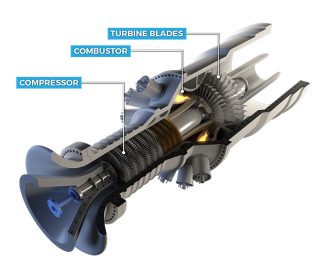The U.S. Department of Energy’s Office of Fossil Energy (FE) has selected nine projects to receive $5.4 million in federal funding to support university-based fundamental turbine research. The new research projects were selected under the funding opportunity announcement University Turbine Systems Research (UTSR), which aims to address scientific challenges and applied engineering technology issues associated with advancing the performance and efficiency of gas turbines in combined cycle power generation applications.
The National Energy Technology Laboratory (NETL)-managed UTSR Program consists of a portfolio of gas turbine–focused university projects across a wide variety of technical topics relevant to the gas turbine industry. In addition to the supporting development of advanced technologies that can increase energy efficiency, reduce emissions, and provide additional performance benefits, the program seeks to maintain and enhance U.S. university-based turbine science capabilities to ensure a world-class scientific workforce for future generations.
The newly selected projects will focus on the development of technologies that will accelerate turbine performance, efficiency, and emissions reduction beyond the current-state-of-the-art and reduce the risk to market for novel and advanced turbine-based power generation. The research projects fall under six topic areas.
Topic Area 1—Low-NOx Combustion Technology Development for “Air-Breathing” Advanced Turbines
- Improving NOx Entitlement with Axial Staging—Embry–Riddle Aeronautical University (Daytona, Fla.) will evaluate axial-staged combustor designs using fuel-flexible, low-emission turbine combustion. Axial staging is an important technology capable of improving engine efficiency without increasing emissions. The results of this work will guide strategies to improve efficiency, reduce emissions, and improve performance of power generation combustion systems.
DOE Funding: $600,000; Non-DOE Funding: $203,247; Total Funding: $803,247
- High Frequency Transverse Combustion Instabilities in Low-NOx Gas Turbines—The Georgia Tech Research Corporation (Atlanta, GA.) will focus on experimentation and computational model development for large-diameter, multi-nozzle turbine combustors. The new models will be used for developing new design tools, which will improve turbine operating performance when implemented.
DOE Funding: $599,794; Non-DOE Funding: $150,009; Total Funding: $749,803
Topic Area 2—Advanced Cooling Technology Development for “Air-Breathing” Advanced Turbines
- Discrete Element Roughness Modeling for Design Optimization of Additively and Conventionally Manufactured Internal Turbine Cooling Passages—The Pennsylvania State University (University Park, PA) will develop a computational 3-D model that can be implemented within current turbine manufacturing design practices. The results of this work are expected to provide significant gains in turbine operating temperature, durability, and lower cooling flow requirements, leading to transformational impact on the gas turbine field
DOE Funding: $600,000; Non-DOE Funding: $150,740; Total Funding: $750,740
- Integrated Transpiration and Lattice Cooling Systems Developed by Additive Manufacturing with Oxide-Dispersion-Strengthened Alloys—The University of Pittsburgh (Pittsburgh, PA.) will develop an innovative approach to improve the level of thermal protection for hot-section components, such as turbine airfoils, in current and future gas turbines. The team’s work will build on proven anti-oxidation material (i.e., oxide dispersion strengthened alloys) and use advanced additive manufacturing technologies.
DOE Funding: $600,000; Non-DOE Funding: $177,192; Total Funding: $777,192
Topic Area 3—Advanced Materials Technology Development for “Air-Breathing” Advanced Turbines
- Integrated TBC/EBC for SiC Fiber Reinforced SiC Matrix Composites for Next-Generation Gas Turbines—Clemson University (Clemson, SC.) will design an integrated thermal barrier coating (TBC) system for use in gas turbines. This research will facilitate the emergence of a reliable and industrially viable coating system for use in next-generation high-efficiency gas turbines. Implementation of advanced thermal barrier coatings will improve the cost and lessen the environmental impacts of generating electricity from gas.
DOE Funding: $599,995; Non-DOE Funding: $210,000; Total Funding: $809,995
- Development of High Performance Ni-Base Alloys for Gas Turbine Wheels using a Coprecipitation Approach—Ohio State University (Columbus, OH) will focus on the design and development of novel superalloys with improved creep strength under high operating temperatures. Incorporation of heat-resistant alloys into turbine wheels will lead to improved turbine performance and operating efficiency.
DOE Funding: $600,000; Non-DOE Funding: $236,651; Total Funding: $836,651
Topic Area 4—Big Data Analytics
- Real-Time Health Monitoring for Gas Turbine Components using Online Learning and High Dimensional Data—The Georgia Tech Research Corporation (Atlanta, GA.) will use two industry-class gas turbine component test rigs to generate first-of-its-kind data for critical gas turbine faults with varying severity levels. The results of this work will be curated and made publicly available to the power generation community. The effort will leverage existing world-class research facilities that will generate the first publicly available data with simulated combustor and turbine faults.
DOE Funding: $600,000; Non-DOE Funding: $150,297; Total Funding: $750,297
Topic Area 5—Advanced Instrumentation
- In-situ Optical Monitoring of Operating Gas Turbine Blade Coatings Under Extreme Environments—The University of Central Florida (Orlando, FL.) will research and develop advanced monitoring techniques to ensure the integrity and durability of thermal barrier coatings used on turbine components. The team will use key properties of optical radiation to gain diagnostic information on high-temperature performance. The monitoring technique will be demonstrated at laboratory scale with the goal of future implementation for gas-turbine-ready conditions.
DOE Funding: $600,000; Non-DOE Funding: $279,488; Total Funding: $879,488
Topic Area 6—Pressure Gain Combustion
- Fuel Injection Dynamics and Composition Effects on RDE Performance—The Regents of the University of Michigan (Ann Arbor, MI) aim to advance current understanding of injector dynamics and evaluate the effects of multi-component fuels (syngas and hydrocarbon blends) on rotating detonation engine (RDE) operation. The computational codes and models developed through this project will use an open source framework, increasing the likelihood of industry adoption. Additionally, experimental tools and databases resulting from this project pertaining to fundamental aspects of rotating detonation engines will be available to the design community.
DOE Funding: $600,000; Non-DOE Funding: $200,000; Total Funding: $800,000
The Office of Fossil Energy funds research and development projects to reduce the risk and cost of advanced fossil energy technologies and further the sustainable use of the Nation’s fossil resources. To learn more about the programs within the Office of Fossil Energy, visit the Office of Fossil Energy website or sign up for FE news announcements.




